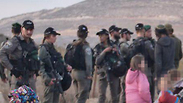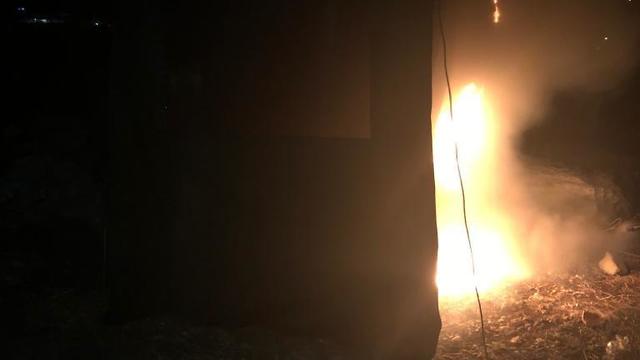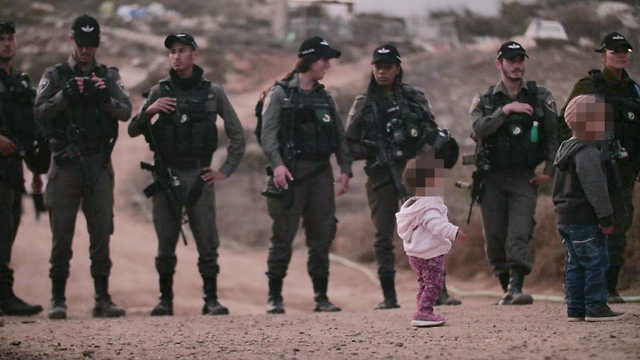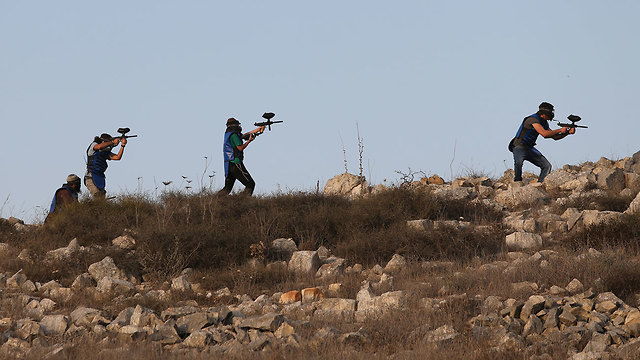
Fifteen IDF troops have been posted to protect Kumi Ori Hill, an illegal outpost in the West Bank settlement of Yitzhar, in which only seven families reside.
IDF Central Command Commander Maj. Gen. Nadav Padan had signed an order two weeks ago making the outpost a closed military zone. The decision came after a slew of violent incidents, culminating in 30 settlers hurling stones at IDF troops, lightly wounding one of them and damaging their vehicle.
Padan's move escalated the already tense situation on the ground, with at least 10 more violent incidents against soldiers reported.
Declaring the area a closed military zone was meant to prevent violence committed by supporters of the seven families who live in the outpost.
The hilltop was often visited by youth from other settlements and from all over the country. Some would attend classes in the makeshift seminary set up on the premises, while others assumed goat herding or other farming or maintenance jobs.
Many of these visitors were known to the Jewish department of the Shin Bet security agency and had been arrested in the past.
The leadership of the settlement decided to ban the youth from visiting the area, assuming they were the source of at least some of the troubles.
It is the soldiers though, who were being made to pay for that decision along with the families, who have remained on-site and are bound by the military's decree.
To enforce the directive, 15 Border Police troops were deployed in eight-hour shifts around the clock, tasked with ensuring only registered residents enter.
The Border Police troops, who did not know the families they were guarding, often demanded to see identification cards proving they live there, much to the locals' chagrin.
In addition to the 15 soldiers stationed on the hilltop, there are 40 additional fighters stationed around the settlement who oversee the safety of Palestinian olive pickers tending to their trees.
Most often, only 10 Israeli military personnel would have been assigned to guard the pickers, but after recent clashes with settlers, who attacked Palestinians as well as soldiers, the military had decided to increase its forces' presence in the area.
These troops have been in charge of securing the Tapuah Junction, the roads leading to Nablus, Jerusalem and the Jordan Valley.
Until recent events, soldiers posted to the area of Yitzhar and the neighboring Palestinian villages were preoccupied with thwarting terror attacks in the Nablus area. They were sent on nightly excursions to detain terror suspects.
"Now our fighters find themselves carrying out civilian police duties, chasing children and teens, preventing them from entering the closed area," Said a local official, adding that the soldiers are frustrated by the assignment.
The soldiers were instructed to record any incident on the ground while assuming they themselves were being filmed at all times by settlers.
"There is a lot of pressure living under the Big Brother's constant gaze," said a security official posted to the area. "Each movement you make is filmed and you have to understand that the reality there is complex. These soldiers did not enlist for this kind of task".
The settlers seem to be trying to provoke the troops and make their jobs more difficult - using both verbal and physical violence.
"My neighbors and I were all asked to show our IDs when we came home with sleeping children in our arms," Aviya Danino told Ynet's sister publication Yediot Ahronoth, as she described the hardships of living in a closed military zone. "I was trying to get home to my daughter, whom I had not seen since early in the morning. She had been waiting for me for the past two hours at a neighbor's house".
Danino describes the soldiers' unreasonable demands, as they reprimanded her for not carrying her ID with her while going to pick up her child. "All the while my daughter is crying, asking to go home," said Danino.
Residents of Yitzhar began holding protest vigils after Danino's story became public, demanding the harassment stop, while children from the settlement and the area began running up to the closed military zone. The troops were unable to enforce the orders as settlers passed by them.
"My young children never knew the concept of confronting a soldier, but the past couple of weeks have been too much," a local told Ynet.
The settler also said that though parents try to explain the situation to their young kids, the children pick up on the tension.
"A new generation of people, who will not respect the law or the security forces, is being primed," he said, blaming the military's irrational position on the matter.
"Police and military vehicles are coming in and out every few minutes, bringing soldiers in for their shifts and taking others out. This causes discomfort in the settlement," he said. "There are only families left on the hilltop, and they should not be blamed for what some misbehaving youth have done".



















